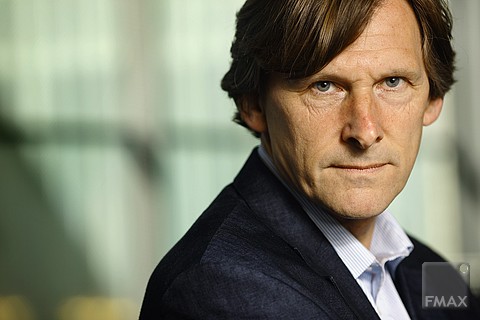TBM-filosoof Jeroen van den Hoven leidt van 21 tot 26 juni de summer school ‘responsible engineering in a warming world’. “We willen mensen afleveren die hun hart op de goede plaats hebben, die deskundig zijn en dat op een moreel juiste manier inzetten.”
Wat hebben filosofie en ethiek te maken met de klimaatverandering?
“Klimaatverandering is met veel risico’s, onzekerheden en verwarring omgeven. We willen weten: wat is goed om te doen en wat niet. Dat is een ethische vraag. Zie de CO2-opslag in Barendrecht. Op zichzelf is het misschien goed om CO2 op te slaan en als je in Delft om je heen vraagt, dan zegt men: het is hartstikke veilig. Maar is het wel netjes om dit de mensen die in Barendrecht wonen door de strot te duwen?”
Mensen willen het niet in hun achtertuin.
“Natuurlijk speelt dat een rol, maar waar je niet omheen kunt is dat huizenprijs met tien procent daalt als de CO2-opslag doorgaat. Hier aan de TU zeggen we: geen gepreek, denk na over een slimme oplossing. Hoe kan het voor mensen acceptabel worden? Dat kan bijvoorbeeld door ze te compenseren met een lagere energierekening.”
Je koopt ze om?
“In de eenentwintigste eeuw gaat de eerlijke verdeling van lasten als vervuiling en risico’s een belangrijke rol spelen. Ingenieurs worden soms boos als mensen niet willen. Het is toch veilig, vinden zij. Neem zulke prikkels meteen mee in je ontwerp, denk na over de ethische en maatschappelijke impact.”
Hoe ver reikt de verantwoordelijkheid van ingenieurs?
“De eenentwintigste eeuw is de eeuw van de high technology. In alles zit technologie. De verantwoordelijkheid is dus heel groot. Dat moeten ingenieurs aanvaarden en ze moeten ermee om leren gaan.”
Hoe doe je dat als broekie bij een grote oliemaatschappij? Of moet je daar vanuit ethisch oogpunt niet willen werken?
“Natuurlijk wel. Maar wat je hoopt is dat ook de jonge mensen zich beijveren voor veiligheid. Kijk naar BP: je bent je bedrijf kwijt als je dat niet doet. Ik hoop dat jonge mensen niet bij het minste of geringste denken: de baas zegt dit, dus dat is het dan. Als je geleerd hebt wat het denken over ethiek is, wat de juridische argumenten zijn, als je weet dat elk systeem perverse trekjes heeft, dan kun je er iets mee doen. Natuurlijk is het moeilijk. Ethiek is een rem op wat je zou willen en waartoe je geneigd bent.
Het economisch denken viert hoogtij. Hoe stel je je daartegen teweer?
“De commerciële druk is soms heel groot en je mag best economisch denken, maar je moet een ethische check zetten op wat je wilt doen. Mensen hebben onvoldoende gevoel voor ethiek. Met deze summer school willen we studenten in aanraking brengen met ethisch denken. Niet om idealisten te kweken, maar om mensen af te leveren die hun hart op de goede plaats hebben, die deskundig zijn en dat op een moreel juiste manier inzetten. Neem weer BP. Dat bedrijf wilde niet investeren in techniek die de huidige olieramp misschien had kunnen voorkomen. Het was te duur, maar nu is BP veel duurder uit en is er veel schade aangericht.”
“How do you start a conversation with a Dutch person at a bus stop?” Gitta Montanus asks. “You should complain.” The audience laughs. “The Dutch love to complain about the weather and public transport and so on.” As soon as an international student comes into contact with the Dutch, this will become immediately clear, Montanus says.
Ironically, complaining is what Montanus, a Dutch cultural anthropologist, did most during her lecture, ‘The Dutch Explained’, held last week at TU Delft’s cultural centre. “I’m not enthusiastic about my country,” Montanus adds. Some of the new international students in the audience look more frightened by the minute as her lecture unfolds. ‘Why did I come to this horrible and weird little country’, you could almost hear them asking themselves.
According to Montanus, the Dutch are not tolerant at all. “In the Netherlands, people are indifferent, not tolerant,” she says. “That’s the attitude we have towards gay rights, drugs and foreigners.” As long it doesn’t bother anyone, the people are tolerant. An example of this theory, she claims, is that the Dutch have become less tolerant towards foreigners recently. “On the surface we look tolerant, but we’re not,” she concludes.
This is certainly a strange way to present the Netherlands to international students, and while indeed there is less tolerance towards foreigners than there was before, to state that gay rights, the legalisation of drugs and the right to euthanasia are only born out of indifference seems ridiculous.
Montanus also focuses on the relationship between Dutch men and women in a peculiar way. She tells the audience that it may look like men and women are equal in the Netherlands, but they’re not. She compares this inequality with Botswana and Pakistan.
What Montanus says about indifference and especially emancipation is true for some places and groups in the Netherlands; however, her lecture primarily emphasised the views of a very conservative segment of Dutch society. It’s as if she’s talking about the Netherlands of fifty years ago. Unfortunately, she only superficially explores the regional differences or opposite views held by different generations in the Netherlands.
It would have been far more interesting if Montanus had shown different sides of the Netherlands. She argues for instance that the Dutch are not nationalistic; however, when the Dutch attend an international sporting event, like soccer or speed-skating, they dress up in the craziest orange outfits imaginable, because this is the colour of the Dutch royal family. When asked about this display of nationalism, Montanus states that only rich people dress up. But this is simply nonsense, because, in fact, most of the fanatic orange-clad fans come from the lower social classes. Montanus should have presented the various views of nationalism and tolerance that exist in the Netherlands, instead of emphasizing a very one-sided negative picture of the Dutch.



Comments are closed.